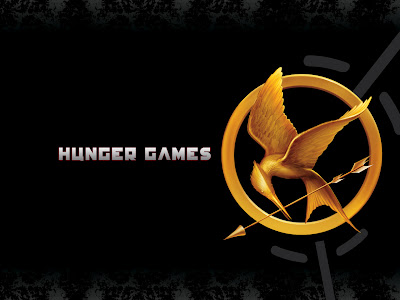Why The Hunger Games?
I have participated in more than half a dozen discussions about The Hunger Games in the last two weeks and so the time has come for me to write something about it. The movie, based on Suzanne Collins' best selling series, has elicited both harsh criticism and glowing praise...and a little of everything in between. But for me, the three most interesting discussion topics involved those who were appalled by the movie's violence, those who couldn't get enough of the love story, and those who see value in the underlying ideas that Collins is trying to teach.
I would first like to address The Hunger Games nay-sayers, particularly those who felt put off by a movie where children are hurting children. At first I tried to vigorously defend the principles and arguments of the book. But gradually I began to see the futility of that effort. The sensibilities of readers and viewers are so vast and different. There are people who shy away from all sorts of difficult subjects, including violence, war, abuse, explicit sexual situations, etc. and I don't think that's a bad thing. There are plenty of subjects that I do not want to be exposed to, regardless of the movie or book's strong points. I've come to realize that with the The Hunger Games, like with all books and movies, if there are people who disapprove of the subject then it is their right and privilege. Tastes are subjective. So, before I offer any more thoughts on The Hunger Games I think it's important to emphasize that this is not a book for every person. And if you didn't like it, that's fine. But that doesn't mean it doesn't have value.
Next I'd like to console all the other women out there who went to see The Hunger Games with the expectation that there would be some good ol' fashioned romance among the killing scenes. Unfortunately for us, I think Collins has worked very hard to minimize the hype of the Gale/Katniss/Peeta love triangle. Undoubtedly the romance helps drive the plot and has increased the story's popularity among its female audience, but you can't help but appreciate Collins' dread at being cast as another Twilight-caliber, teenage heart throb story. This is an author who wants her ideas to be taken seriously and she certainly doesn't allow the romance to remain on center stage for long. In the books the love story sputters to a disillusioned end in Mockingjay, and I believe the movie script consciously dispelled some of the sexual tension that is present in the books. Truthfully, I was bummed out about both of those decisions, but I can see her point and maybe the let down I felt while watching the movie wasn't all Collins' fault. You have to admit that casting Josh Hutcherson as Peeta was about as appealing as casting Jack Black. When the camera fell on Hutcherson during the reaping scene I know I wasn't the only woman who thought to herself, Is that Peeta? Why does he look deformed? Maybe I'm a Gale fan after all!
Teeny-bop romance aside, I believe the ideas in The Hunger Games are important. I think it speaks well of Suzanne Collins that her story is steeped in a strong literary pedigree. Influences such as George Orwell's 1984, William Golding's Lord of the Flies, the Greek myth of Theseus, and Shirley Jackson's short story The Lottery are all present in The Hunger Games. Not one of these classic stories will leave you with warm fuzzies, and yet every one has had a major impact on our society and literary culture. And Collins didn't rely solely on classic literature for inspiration. She was also strongly influenced by her father's experiences in the Vietnam War, and channel surfing through current reality television shows coupled with footage of the invasion into Iraq. I think it is the combination of classic and contemporary influences that has made for such a fascinating, controversial story. Clearly there was a lot going on in this author's head when she sat down to write and for me, it's no wonder college reading lists have already adopted The Hunger Games. As I've discussed and thought about Collins' arguments and the issues that arise in the story I found myself referring back to the basic argument analysis questions that I use when teaching college research and writing courses. Sometimes it's the simplest questions that help distill the bigger picture:
- What is the author trying to teach?
- Who are the villains and why?
- What is upsetting and why do I feel upset?
- Even though the story is fictional, how does it relate to my life? What connections can be made?
I keep introducing these basic questions into my discussions about The Hunger Games because to answer them addresses some of the central issues that Collins hoped to convey. Obviously the questions are just a spring board to begin thinking about these issues, but it's my opinion that a very basic analysis of the question "what are we supposed to take away from this story" eliminates the possibility that Collins' is championing violence among children. Or that she is selling this series as a teenage romance. Or that this is just another Hollywood action movie in the spirit of Iron Man or Die Hard. This is an author who is working to influence our generation's perception of violence and media corruption in, what I think is, a positive and important way.
This week I came across a quotation about Suzanne Collins on movie.org that effectively reinforces my thoughts about The Hunger Games.
What Collins thinks matters a great deal to her fans, although they rarely hear from her directly. Collins has always been a media-shy figure, given to few public pronouncements, most of them carefully packaged. Her indictment of the media in “The Hunger Games” — the camera is the enemy, celebrity an empty, even dangerous contrivance — is reflected in her desire to keep fame at arm’s length. Collins’s readings and appearances are usually off-limits to television cameras, and she declines almost any interaction that involves capturing her on videotape.
I didn't know that Collins is wary of the camera and media attention, but this fun fact is repeated on multiple websites, including Book Review and the New York Times online. Knowing this about her only further convinces me that she believes in her ideas, she is trying to practice what she preaches, and she is one of those very cool writer-ladies I would love to have lunch with some day. But even as I draft this blog post I've had to pause and ask myself the question, why do we bother? We have our own heartache in life to deal with, our own problems. Why read about the brutality of Collins' fictional universe?
And then I imagined George Orwell sitting on the island of Jura, just off the coast of Scotland, laboriously drafting what would become 1984. In the aftermath of World War II Orwell set out to create something that would capture the despair that had enveloped much of the world. He gave name to the suffering, and by writing 1984 he created a fictional reality so thought-provoking that it succeeded in stretching its arms around the twentieth century, as if to say, Is this what is to become of us?
This is what good books do. I can imagine hundreds of authors from across the centuries echoing in a quiet voice, I'm going to tell you a very sad story. And I hope it will make a difference.


Way back in 1850, La Censura were trying to edit the librettos of Verdi's operas....they wanted to take out death, sadness, affairs, deformity of characters, etc. What would we do if we were left with only vanilla story-lines? Sad stories (and those where characters do things we wouldn't do in our own lives) teach us valuable things. Love your work, Lauren.
ReplyDeleteyou are so awesome. great post.
ReplyDeleteAbsolutely - great post. I was very disturbed by The Hunger Games, just like I was very disturbed by Lord of the Flies, 1984 and how about Brave New World? Being disturbed makes us think and teaches us things that we can't learn any other way. To me, the true magic of a book is the ability to experience something by reading that we would not, or would not want to, experience in our own lives.
ReplyDeleteLauren coached my 13 year old boy through The Hunger Games last year during a literature/writing course she did with him. It was an amazing experience for him. It has made a difference in the way he views what he reads and what he sees - fiction and non-fiction.
Very well-said Lauren. I have tried to explain similar points about Hunger Games recently and wish I had your eloquence and literary references to back me up. Now I do if it comes up again. And I really do wish the romance were a bigger part of it. It was the spoonful og sugar that helped the medicine go down.
ReplyDelete